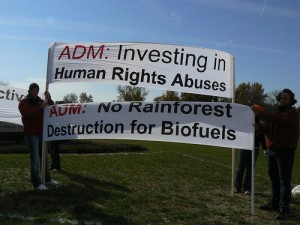
Unlike 2008’s showdown, nobody from RAN attended this year’s Archer Daniels Midland (ADM) shareholder meeting to hold CEO Patricia Woertz’ ass to the fire. Nonetheless, ADM did not get away without responding to tough questions about the company’s irresponsible palm oil supply chain.
ADM, one of the world’s largest agricultural processors with operations in more than 75 countries, held its annual shareholder meeting on Thursday in it’s hometown of Decatur, Illinois. ADM CEO Patricia Woertz proudly announced that the company increased its quarterly cash dividend from 16 cents per share to 17.5 cents per share. Happy news for shareholders, right?
Well, probably not if they knew the dirty truth: they are invested in a company complicit in gross human rights violations in Indonesia.
The most significant part of this year’s meeting was that shareholders presented a powerful resolution on palm oil, resolving that the board of directors adopt and implement a comprehensive sustainable palm oil policy. Not surprisingly, and by way of shedding light on the true nature of this company, the Board of Directors recommended a vote AGAINST this stockholder proposal.
The resolution included:
• A target date for sourcing 100% certified sustainable palm oil and for segregating and tracing certified palm oil throughout the supply chain;
• Plans to verify suppliers’ compliance with the policy; and
• Supporting a moratorium on palm oil expansion in rainforests and peatlands.
It’s too bad ADM didn’t welcome this resolution — it could have been a positive step in the right direction for a laggard of a company. A concerned shareholder attended the meeting and raised a few of her concerns about palm oil, which I’ve summarized below:
– Indonesia is the 3rd largest producer of greenhouse gases behind china and the US thanks to deforestation linked to palm oil plantation expansion, exacerbating climate change.
– ADM sources palm oil from one of the most biodiverse areas in the world, the last remaining habitat for the critically endangered orangutan, meaning they will likely become extinct.
– Indigenous people are also losing their homes and livelihoods to plantations; when they resist, they are arrested, and their homes bulldozed. This violates the standards of the RSPO, of which ADM is a member.
These comments led to an important question. The shareholder asked Woertz what ADM was doing to address the fact that Wilmar, a massive palm oil plantation company with operations in Indonesia and Malaysia of which ADM is a major shareholder, violated the RSPO code of conduct by bulldozing an Indigenous community when it got in the way of the company’s operations. Ms. Woertz responded by saying that most of the charges by the community were found to be “without merit” but that there were some issues found to have validity regarding the land, and that those investigations are still ongoing.
The CEO also said that, “as far as committing to 100% sustainable palm oil, we believe this can be done most effectively through a group effort, not by acting alone.” I beg to disagree. As the three top importers of palm oil into the US, I believe ADM, Cargill and IOI all have a responsibility to commit to 100% RSPO certified palm oil as the bare minimum standard for their US customers.
Hopefully shareholders continue to challenge ADM on its misleading claims. Any claims by ADM that it is taking the environment into consideration are completely toothless without a palm oil policy in place to make even the most basic level of assurances to its customers by adopting supply chain safeguards. With these safeguards in place, palm oil produced by companies that think bulldozing a community is a viable dispute resolution mechanism will never end up in our homes.